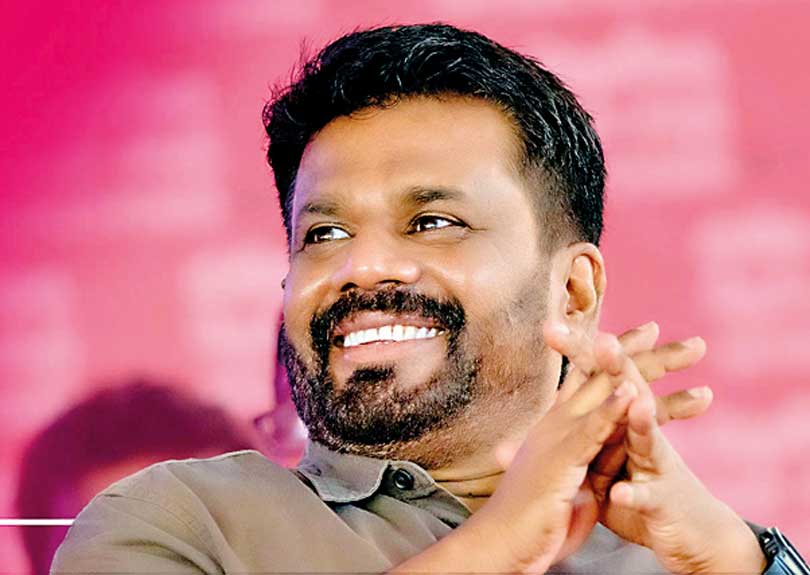Thursday Feb 19, 2026
Thursday Feb 19, 2026
Tuesday, 24 September 2024 00:02 - - {{hitsCtrl.values.hits}}

Anura Kumara Dissanayake
 Congratulations to Anura Kumara Dissanayake (AKD), the ninth Executive President of Sri Lanka! As you take on the profound responsibility of leading our nation, we trust that your leadership will bring about transparency, integrity, and a renewed focus on the well-being of all Sri Lankans.
Congratulations to Anura Kumara Dissanayake (AKD), the ninth Executive President of Sri Lanka! As you take on the profound responsibility of leading our nation, we trust that your leadership will bring about transparency, integrity, and a renewed focus on the well-being of all Sri Lankans.
AKD’s election marks a critical turning point in Sri Lanka’s political landscape, as voters signal a deep desire for change. However, the real challenge begins now. His journey will be defined not merely by the electoral victory but by how well he can deliver on the promises and expectations of the people.
Understanding the vote for AKD
For any leader, it’s essential to understand why people vote for them. In the past, some candidates misinterpreted their electoral success as a sign of personal popularity, much like that of a film star. These candidates, often buoyed by large vote margins, failed to realise that their support was context-driven and not purely personal. Voters chose them because they seemed the best fit to address the nation’s needs at the time.
In AKD’s case, his remarkable leap from 3% of the vote in 2019 to over 40% in 2024 is not simply a reflection of personal popularity but a broader public demand for systemic change. This surge in support speaks to the growing frustration with the status quo. AKD’s election is a symbol of the people’s hope for a fresh start, a rejection of decades of corruption and political failure. He now stands as the figurehead of a movement that seeks a new chapter in Sri Lanka’s history, much like the expectations that accompanied Gotabaya Rajapaksa’s election in 2019.
Why the people chose change
Sri Lanka’s political system has long been defined by broken promises, short-term incentives, and leaders who fail to deliver on their commitments. AKD’s election represents a vote against this entrenched political culture. The people are exhausted by the rampant corruption, nepotism, and hollow manifestos that have plagued the leadership for decades. They want a new direction—one that prioritises integrity, fairness, and a genuine commitment to serving the public.
AKD’s challenge will be transforming this desire for change into meaningful action. The people have chosen him as the candidate most likely to bring about the reforms they need. But the true victory will only come if he successfully delivers on the promises that drove his election. If he fails to implement meaningful reforms and meet public expectations, he risks repeating the mistakes of Gotabaya Rajapaksa.
10 reasons why people voted for AKD
1. Rejection of corruption: Voters, tired of rampant corruption in political institutions, saw AKD as a break from the past, promising cleaner governance.
2. Demand for accountability: Sri Lankans yearn for leaders who are accountable to the public, not just their inner circles or political patrons.
3. Economic mismanagement: The economic collapse in 2022 exposed the failure of previous governments, and AKD represented a fresh alternative to economic mismanagement.
4. Anti-nepotism sentiment: The practice of appointing family and friends to high positions has long fuelled public frustration. AKD’s stance against nepotism resonated deeply with voters.
5. Desire for good governance: People voted for a leader who would prioritise transparent, competent, and responsible governance.
6. Frustration with the political establishment: For many, AKD represented a rejection of the political elites who have dominated Sri Lankan politics for decades.
7. Social justice: Many voters were drawn to AKD’s commitment to creating a more equitable society and addressing long-standing social disparities.
8. Youth vote: Younger voters, energized by recent political activism, saw AKD as someone who would push for reforms that benefit future generations.
9. Focus on public services: AKD’s pledge to improve public services such as healthcare, education, and infrastructure resonated with citizens tired of neglect.
10. IMF and debt solutions: Amid ongoing IMF reforms, the NPP, under AKD’s leadership, is seen as a party that strives to renegotiate better terms for the people without imposing additional austerity measures.
10 priorities for the incoming President
While AKD’s election reflects the public’s demand for change, his success will depend on his ability to transform expectations into action. His agenda must be clear, with a focus on urgent issues and long-term strategies. Based on his manifesto and campaign discussions, here are 10 key priorities for AKD as he assumes office:
1. Economic recovery
Stabilising the economy must be AKD’s top priority. This involves managing national debt, reinforcing fiscal discipline, and fostering sustainable growth post-crisis. A focus on creating a business-friendly environment, especially for Small and Medium Enterprises (SMEs), will be essential. Encouraging entrepreneurship, reducing regulatory barriers, and improving access to finance are critical steps in building a robust, resilient economy.
2. Anti-corruption reforms
Implementing strong anti-corruption measures is vital to restoring public trust. AKD’s government must prioritise transparency, enforce strict anti-corruption laws, and promote accountability across all sectors. By rooting out corruption at every level, AKD can begin to rebuild confidence in government institutions.
3. Judicial independence
Judicial independence is fundamental to maintaining the rule of law. Ensuring that the judiciary operates free from political interference will foster public trust in the legal system. Upholding the judiciary’s autonomy will promote fairness and ensure accountability across the executive and legislative branches.
4. Strengthening public institutions
Public institutions, particularly state-owned enterprises, must be depoliticised and made more efficient. AKD’s government should focus on appointing qualified professionals based on merit and implementing reforms that improve accountability and performance. By fostering a professional culture within these institutions, AKD can improve service delivery and reduce corruption.
5. Reforming the political system
One of AKD’s key priorities must be curbing the excessive powers of the executive branch. This includes creating a balanced system of governance by strengthening the role of parliament, empowering independent institutions, and ensuring transparency in decision-making. Such reforms will help restore public trust in government.
6. Youth empowerment
Addressing youth unemployment is critical for Sri Lanka’s economic future. AKD must prioritise vocational training, education, and entrepreneurship opportunities to equip young people with the skills they need. Creating policies that promote job creation and incentivise businesses to hire young workers will ensure the next generation’s meaningful contribution to national growth.
7. Social justice and equality
Promoting social equity must be a top priority. AKD’s administration should focus on providing fair access to essential services like healthcare, education, and housing. Reforms should address systemic inequalities and ensure that public services are delivered swiftly and without bureaucratic red tape or corruption.
8. Revitalising public services
Improving healthcare, education, and infrastructure is critical for long-term growth. AKD must modernise healthcare systems, expand facilities in underserved regions, and raise educational standards. Strategic investments in infrastructure, especially in rural areas, will stimulate economic growth and reduce regional disparities. Unlike past projects, which lacked proper planning and fostered corruption, future development must be transparent and grounded in well-justified needs, prioritising the public good over political gain.
9. Environmental sustainability
With climate change posing a serious threat to Sri Lanka, AKD must prioritize sustainable development policies. His administration should focus on renewable energy solutions, such as solar and wind, to reduce carbon emissions and enhance climate resilience. AKD’s vision for environmental sustainability will also ensure long-term economic growth while protecting natural resources.
10. Foreign policy and international relations
AKD’s administration must navigate relationships with key global players, including the IMF, China, and India, to secure both economic stability and strategic alliances. Cooperation with the IMF will be essential for financial restructuring, while balanced ties with China and India will foster investment and regional security.
A new political culture
The National People’s Power (NPP) has made significant promises through its manifesto, including the aforementioned points, raising high expectations among the public. Unlike in the past, when political promises often went unfulfilled, Sri Lankans are now more vigilant and will closely monitor AKD’s performance. The NPP will be held accountable for delivering on its pledges, from economic reforms to social justice and environmental sustainability. This shift reflects a new political culture where transparency and action are paramount, and any failure to meet expectations could erode trust in AKD’s leadership.
One of the complaints made by certain leaders, including outgoing President Ranil Wickremesinghe, was that he was not given a capable team to implement reforms and drive the economic agenda. Now, the people have the chance to elect a strong, competent team in the upcoming parliamentary elections, ensuring the new president has the necessary support to deliver on his promises without any hindrance.
Conclusion
As AKD takes on the presidency, his ability to rise to these challenges will determine his success. The people have made it clear that they expect action, not just words. AKD’s true victory will come when he fulfils the mandate for change that the people have entrusted him with. A significant number of professionals, experts and patriotic citizens, are ready to offer their unconditional support in rebuilding the nation and fostering a new political culture.
I hope that under AKD’s leadership, and with the collaboration of the public, Sri Lanka will embark on a brighter, more prosperous future—one built on the foundations of transparency, integrity, and a true commitment to the needs of its people.
(The writer is a Senior Chartered Accountant, Management Consultant, Business Advisor, and Thought Leader. He can be reached via [email protected].)